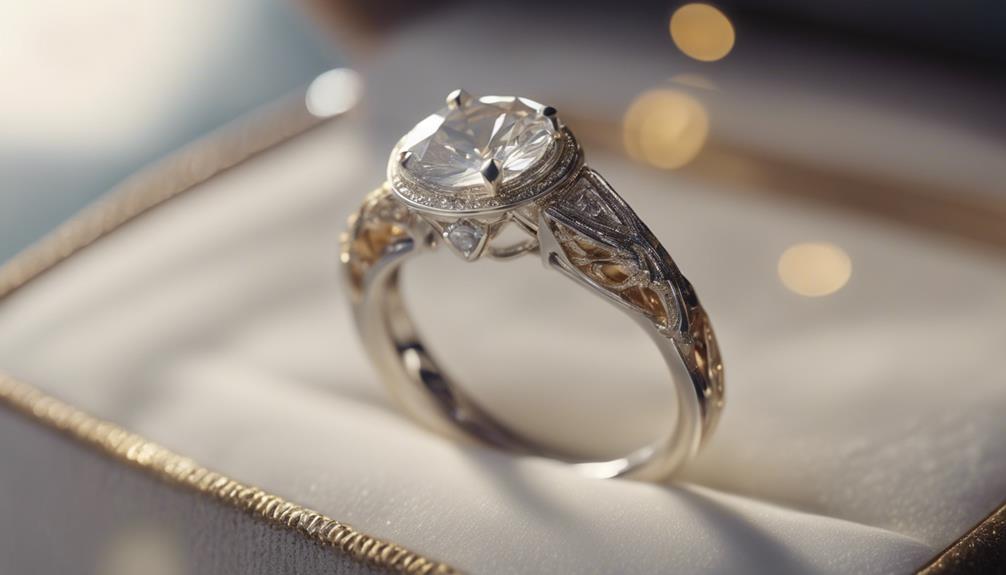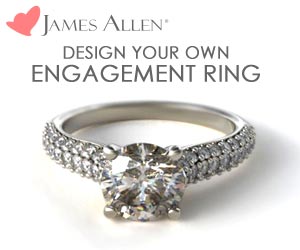Yes, an engagement ring warranty is often worth it for covering manufacturing defects and routine maintenance, like cleaning and prong adjustments. These warranties usually don’t cover loss, theft, or accidental damage, so you’ll want separate insurance for those risks. Durations range from one year to a lifetime, depending on the jeweler, and regular inspections are often required to keep the warranty valid. Using unauthorized repair services can void your warranty, so always follow the terms. Knowing what’s included in the warranty helps you decide its value and if it suits your needs. Learn about all the aspects involved!
Understanding Engagement Ring Warranties
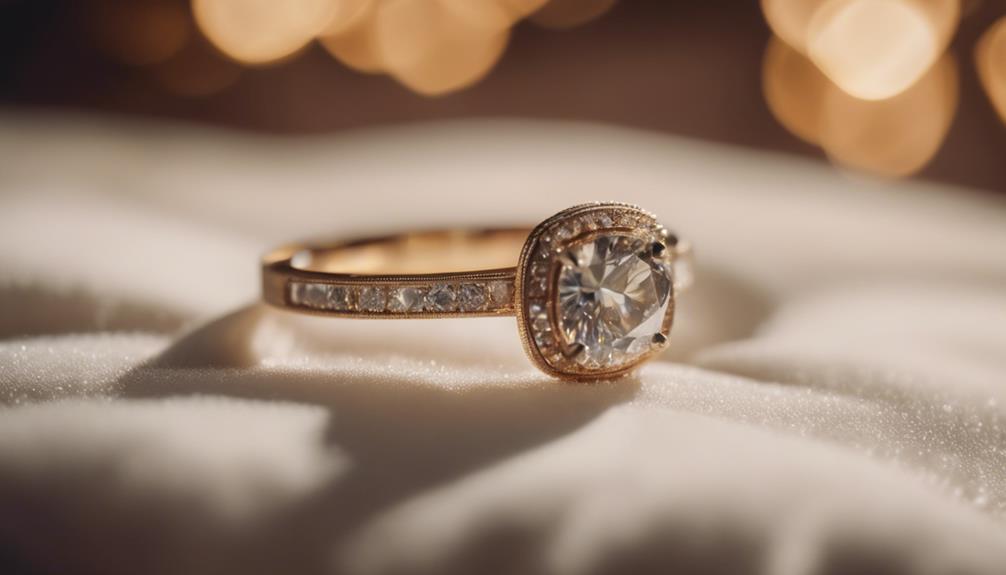
When you’re contemplating an engagement ring warranty, it’s essential to understand what these plans typically cover and the conditions they entail. Engagement ring warranties often cover manufacturing defects and normal wear, providing services like free repairs, cleaning, and basic maintenance. This can be reassuring, but you should know that coverage doesn’t extend to loss, theft, or accidental damage. That’s where the engagement ring warranty vs. insurance policies debate comes into play—insurance policies usually cover those additional risks.
Most warranties last anywhere from one year to a lifetime, depending on the seller, and generally cost about 10-15% of the ring’s purchase price. The financial aspect is important to evaluate, especially since compliance with warranty terms is non-negotiable. You’ll likely need to adhere to strict inspection schedules and maintenance requirements to keep the warranty valid. Missing these inspections can void the warranty, rendering it useless when you need it most.
Understanding the specific exclusions and limitations is essential for making an informed decision. While warranties offer some coverage for normal wear and defects, they may not provide the all-encompassing protection you’re looking for without additional insurance.
Coverage and Exclusions
Covering both manufacturing defects and basic maintenance, engagement ring warranties offer specific protections but come with notable exclusions.
You’ll find that warranties typically cover issues like improperly placed prongs and structural flaws. They also often include basic maintenance services such as cleaning, resizing, and polishing.
However, understanding what’s excluded is just as important as knowing what’s covered. Warranties generally don’t cover normal wear and tear, accidental damage, loss, or theft. This means that over time, as your ring experiences everyday use, the warranty won’t help you with those inevitable scratches and dings.
Here are three common exclusions you should be aware of:
- Accidental Damage: If your ring gets accidentally damaged, the warranty likely won’t cover the repair costs.
- Loss or Theft: Warranties usually exclude coverage for lost or stolen rings, leaving you to deal with the financial impact.
- Third-Party Repairs: Any repairs made by third parties can void your warranty, so always stick to authorized service providers.
Understanding these exclusions is vital when deciding if a warranty is right for you. Sometimes, an insurance company might offer a more flexible and all-encompassing alternative for your ring’s long-term protection.
Duration and Extension Options
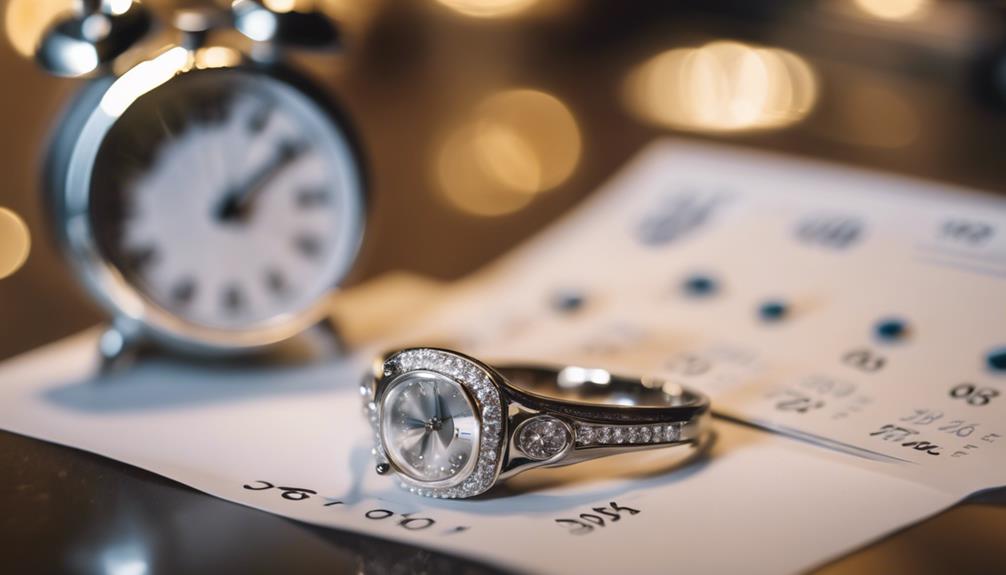
Evaluating the duration and extension options of an engagement ring warranty helps you understand how long your ring will be protected and what steps you need to take to maintain that coverage. Typically, warranty duration ranges from one year to a lifetime, depending on the jeweler’s policies. If you want extended protection, many jewelers offer an extended service plan for an additional fee, ensuring your ring remains covered beyond the standard term.
It’s important to note that routine inspections are often required to keep the warranty valid. Missing these inspections can void your coverage, so staying on top of them is critical. Some warranties may also automatically renew once you complete the required maintenance, extending your coverage without the need for an additional purchase. Understanding the renewal terms is essential; missing deadlines for these inspections can lead to a lapse in your warranty.
While considering these options, you might also explore engagement ring insurance as an alternative. Insurance can offer more flexible and thorough protection, potentially providing better long-term security for your investment. Weighing the benefits of both can help you decide which option best suits your needs.
Warranty Terms and Conditions
Understanding the warranty terms and conditions is essential to guarantee you know exactly what’s and isn’t covered for your engagement ring. Most warranties provide coverage for defects in materials and craftsmanship but often come with a range of exclusions. Knowing these specifics can save you from unpleasant surprises down the line.
- Coverage: Typically, warranties cover issues like loose stones or faulty clasps that result from poor workmanship. They might also include basic maintenance services such as resizing and polishing.
- Exclusions: Common exclusions include normal wear and tear, loss, theft, and accidental damage. Repairs done by third parties can also void the warranty, which means you’ll need to stick with authorized service providers.
- Maintenance: To keep the warranty valid, you’re usually required to have regular inspections and cleanings, often every six months. Missing these can nullify your coverage, making it vital to adhere to the stipulated schedule.
When it comes to claims, be prepared for stringent conditions. Many warranties demand meticulous record-keeping and might complicate the process if you miss any required maintenance. Always review the fine print and understand these terms thoroughly to make the most of your engagement ring warranty.
Comparing Warranty and Insurance
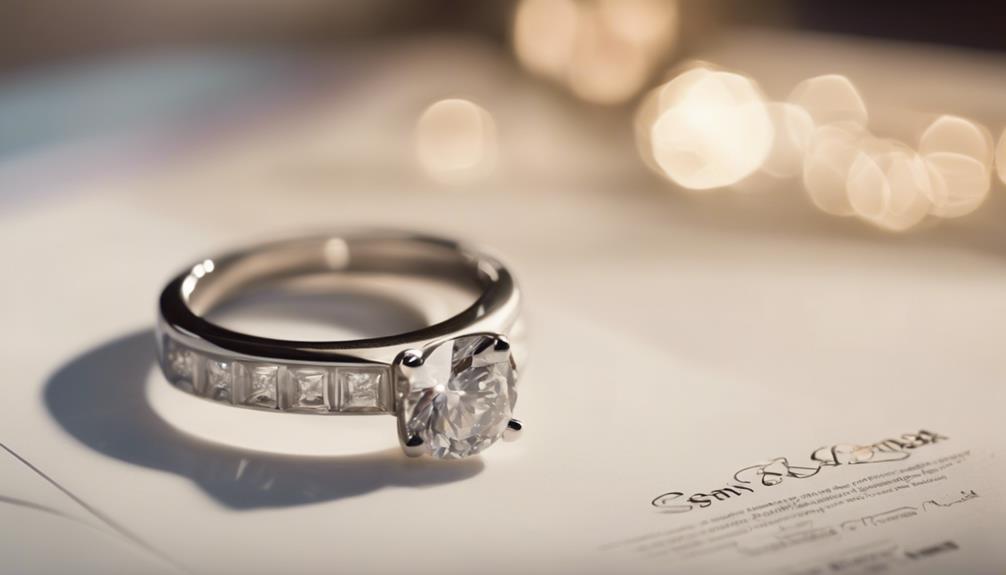
While it’s important to grasp the warranty terms and conditions, comparing this option to insurance can help you decide which protection best suits your engagement ring.
A warranty usually covers manufacturing defects and basic maintenance, but its coverage is limited. You’ll find that it doesn’t protect against loss, theft, or accidental damage. On the other hand, insurance provides broader protection, making it a more thorough safeguard for your ring.
A jewelry insurance policy typically covers scenarios that a warranty won’t, like theft or accidental damage. It requires ongoing premiums based on the ring’s value and your chosen coverage options. While warranties are often included with the purchase or come at a small fee, they have strict conditions and limited timeframes. Insurance, however, offers customizable, long-term protection, which can be more reassuring.
Moreover, the claims process differs greatly. Warranties demand proof of a defect, while insurance requires proof of loss or theft, making the latter more beneficial for various incidents.
Also, consider homeowners insurance as an alternative; some policies can be extended to cover engagement rings, providing another layer of security. Understanding these differences helps you make an informed decision tailored to your needs.
Conclusion
When deciding if an engagement ring warranty is worth it, weigh the coverage, exclusions, and conditions carefully.
Don’t forget to reflect on how the warranty compares to insurance.
While a warranty might offer peace of mind, its stringent terms could complicate claims.
Conversely, insurance might provide more flexibility and value.
By thoroughly examining both options, you’ll make an informed choice that keeps your investment protected and your heart at ease.

